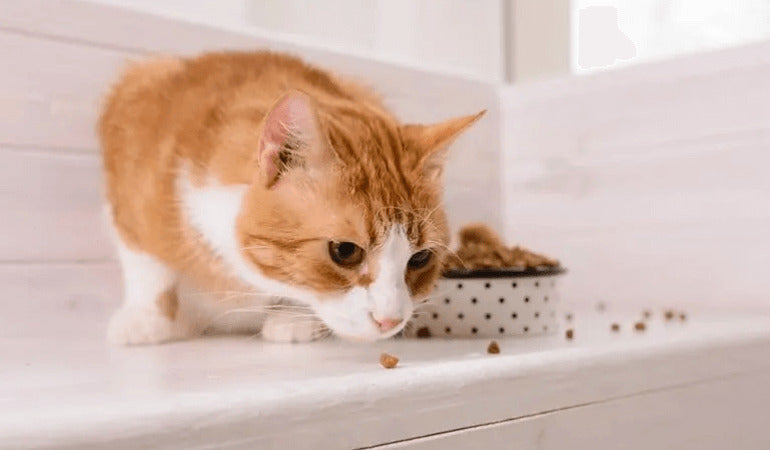Imagine this: you carefully choose the cutest ceramic cat bowl with tiny whiskers, put it on a pretty placemat, and proudly serve a fine meal to your cat. But to your surprise, your cat decides to go on a culinary adventure instead of eating, taking food out of the bowl, and causing trouble as it goes.
Before you jump to conclusions or think something is wrong, let's look into what cats like to eat and find out why they do strange things.
Natural Hunting Instincts

Cats are known for their independent and free nature. Go back in time, and you will find that their ancestors were skilled hunters who made their living by catching and devouring their prey. These hunting instincts passed down through generations still influence their preferences today. Although domestic cats no longer need to hunt to survive, the instinct to come into contact with food remains strong. By removing food from the bowl, cats mimic the natural behavior of catching and playing with prey. This shows they are naturally curious and want to interact with their surroundings, even when eating.
Picture your cat slapping a piece of kibble on the floor as if it were a swift mouse. Pounce on the floor and slap it. It was an interesting display of their hunting prowess and a reminder of their ancestral roots.
Food Preferences and Picky Eaters

Cats are known to be picky eaters with unique taste preferences. Removing food from the bowl may be their way of expressing dissatisfaction with the meal.
Just like us humans, cats have their dietary preferences. They're not afraid to show off their discerning taste buds, even at mealtime. Removing food from the bowl may indicate that they want their favorite food to appear in the cat's bowl.
Imagine your cat carefully picking through the mix of canned goods, separating the chunks from the gravy. It's as if they've become a culinary master, tailoring meals to their taste buds.
By rearranging food, your cat sends a clear message: "I have certain tastes, human. This food satisfies me, and that one doesn't meet my picky standards."
Whisker Fatigue

Your cat may not put his whole face in the food bowl, but instead, use his hands to get food out of the bowl because his whiskers are tired. Whisker tiredness means that a cat's whiskers are getting too much sensory information, which can make the cat feel uncomfortable or stressed.
Beards, also called beards, can be used for more than just looking cute. They are very sensitive and help cats sense small changes in wind, find their way in the dark, and get a sense of their surroundings. There are sensitive cells at the base of each whisker that send messages to the cat's brain. If the cat bowl is too small, the cat's whiskers will be constantly tickled, which may make the cat feel uncomfortable.
So, cats may use their hands to scoop food out of cat bowls or eat right off the ground so that their whiskers don't touch the sides of the bowl. To keep whiskers from getting tired, you can serve cat food on wide paper plates with low sides or buy "whisker-safe" bowls made just for cats. These cat bowls are usually wider and made of ceramic, stainless steel, etc., to make eating more comfy.
Territory Marking

Removing food from a bowl and placing it elsewhere may be a kind of activity for cats to mark their territory. This means they leave their smell in the area to claim it as theirs.
Have you ever seen your cat pick up a piece of food from a bowl, put it carefully in his mouth, and carry it to a certain spot in the room? By placing a small piece of food in a particular area, your cat will leave behind a scent that we can't smell but that other cats can pick up on. It's like they're saying, "This corner of the room is mine, and I want everyone to know!" Their smell tells other cats to stay away from where they live.
You might even notice that your cat likes to sleep a certain way. It can be on the same window sill, in a cozy living room area, or even under the table. These special spots show where they belong and tell other animals that they are in charge of certain areas.
Unpleasant Odors or Residue in Cat Bowl

Cats have an extraordinary sense of smell that is much stronger than ours. They are very sensitive to smells, and if their food bowl smells terrible or has leftover food in it, they won't eat. If the cat bowl needs to be cleaned well or still smells like old food, your picky cat may have to move the food to a different place to eat.
A clean, uncluttered place to eat for your cat is like a five-star diner. They want their meal to be a pleasure for all their senses, and any smell before it can ruin that.
Be careful if you notice that your cat often takes food out of its bowl and eats it from a clean table or plate. It's their way of saying they like a clean table without smells.
So, clean your cat's bowl well before each meal to ensure it has no leftover food or smells. After all, your cat's dining experience isn't just about how good the food tastes; it includes all of its senses.
In summary, cats may take food out of their bowls for many reasons, such as their natural desire to hunt, picky eating habits, tired whiskers, or to mark their territory. By knowing what they like and giving them what they want, like giving them different ways to eat and ensuring their bowls are clean, you can make mealtimes more enjoyable for your cat. Embrace their individuality and enjoy the whimsical adventures of being a cat owner.





